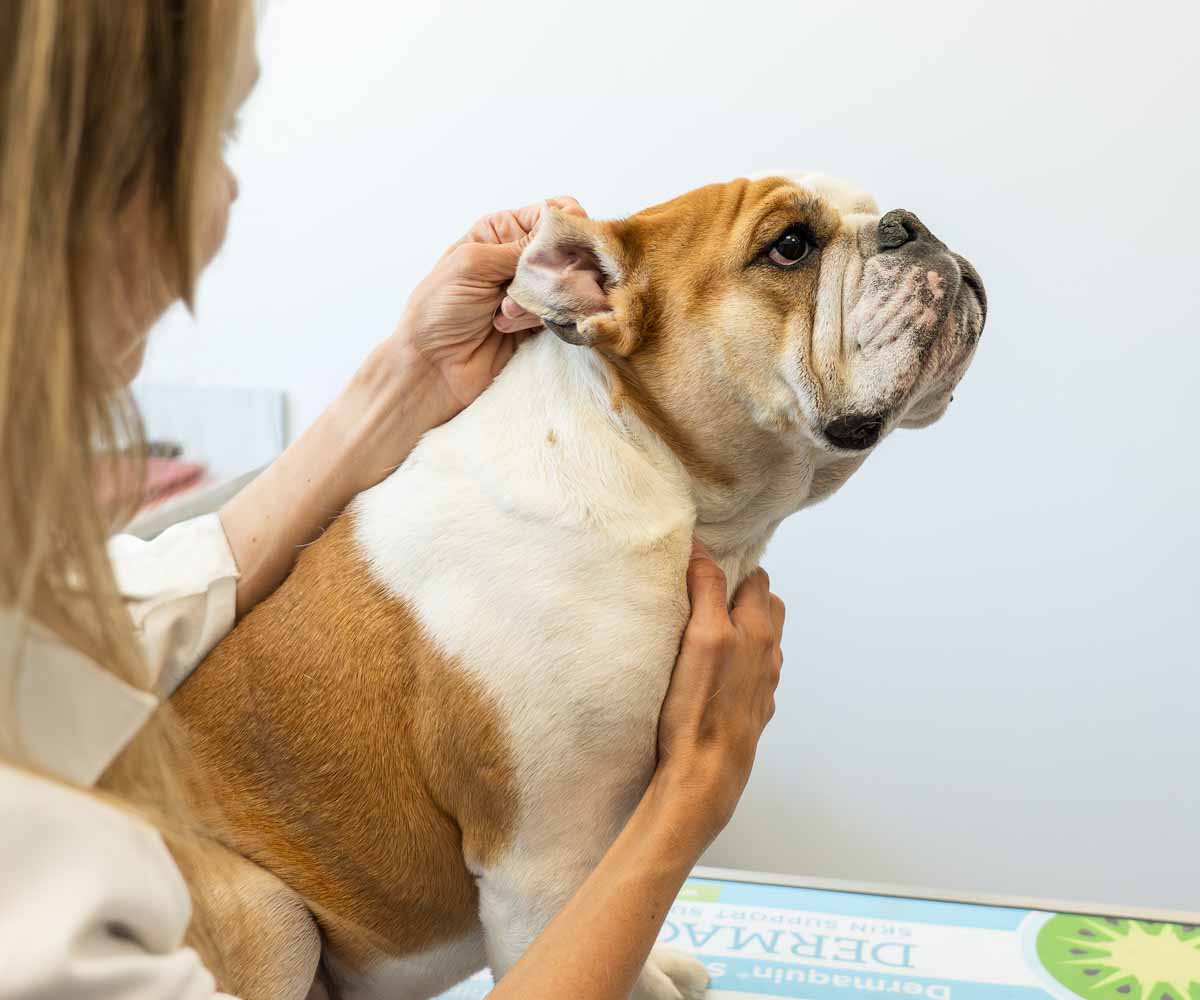How much is a dog dermatologist? The cost can vary widely based on several factors.
Many pet owners face skin issues with their dogs. These problems can include allergies, infections, or other skin diseases. A dog dermatologist specializes in diagnosing and treating these conditions. However, the price of a visit can be a concern for many.
Factors like location, the complexity of the issue, and required tests influence the cost. Understanding these factors helps pet owners plan for veterinary care. This knowledge also aids in finding the right specialist for their furry friend. Let’s explore what to expect when seeking a dog dermatologist and how much it may cost you.

Credit: vrcvet.com
Table of Contents
Introduction To Dog Dermatology
Dog dermatology focuses on skin problems in dogs. Skin issues can cause discomfort. They can lead to serious health problems. A dog dermatologist is a specialist in this field. They can diagnose and treat various skin conditions.
Common Skin Conditions In Dogs
Many dogs face skin problems. Here are some common conditions:
- Allergies: Dogs can be allergic to food, pollen, or dust.
- Infections: Bacterial and fungal infections are common.
- Ectoparasites: Fleas, ticks, and mites can irritate the skin.
- Hot Spots: These are localized areas of inflamed skin.
- Dermatitis: It can be caused by various factors, including irritants.
Recognizing these conditions early is vital. Early treatment can prevent serious issues.
Significance Of Professional Care
Seeking help from a dog dermatologist is essential. They have specialized training. They can perform tests to find the cause of skin issues. Here are some reasons why professional care is important:
- Accurate Diagnosis: A dermatologist can identify the exact problem.
- Effective Treatment: They provide tailored treatment plans.
- Prevent Recurrence: They help manage chronic conditions.
- Improved Quality of Life: Healthy skin leads to happier dogs.
Professional care ensures better outcomes for your pet. It is an investment in their health.

Credit: www.summitdogandcat.com
Factors Influencing Dermatology Costs
Understanding the cost of a dog dermatologist involves several key factors. Each factor can significantly affect the total price. Knowing these can help you prepare for a visit.
Geographical Location
Your location plays a big role in the cost of dermatology services. Urban areas often have higher fees compared to rural areas. Here are some points to consider:
- High demand in cities leads to higher prices.
- Travel costs may add to your overall expense.
- Local competition can lower prices.
Clinic Vs. Hospital
The type of facility also impacts costs. Clinics may charge less than hospitals. Here’s a quick comparison:
| Facility Type | Typical Cost Range |
|---|---|
| Veterinary Clinic | $50 – $200 |
| Animal Hospital | $200 – $500 |
Experience Of The Dermatologist
The dermatologist’s experience can influence fees. More experienced vets may charge higher rates. Consider these points:
- Specialists with advanced training often cost more.
- Years of practice can lead to better outcomes.
- Reputation may also affect pricing.
Choosing a qualified dermatologist can save money long-term. Better care often means fewer follow-up visits.
Initial Consultation Expenses
Bringing your dog to a dermatologist involves certain costs. Understanding these expenses helps you prepare. The first visit is crucial for assessing your dog’s skin issues. Let’s explore what to expect and the average costs involved.
What To Expect
During the initial consultation, your dog will undergo a thorough examination. The vet will:
- Ask questions about your dog’s medical history.
- Examine your dog’s skin, coat, and ears.
- Perform tests, if necessary, to determine the cause of skin problems.
Be prepared to discuss:
- Symptoms you’ve noticed.
- Any previous treatments your dog has received.
- Your dog’s diet and environment.
This information helps the dermatologist provide the best care for your pet.
Average Price Range
The cost of the initial consultation varies. On average, you can expect to pay:
| Location | Average Cost |
|---|---|
| Urban Areas | $150 – $300 |
| Suburban Areas | $100 – $200 |
| Rural Areas | $75 – $150 |
Prices may vary based on the clinic and the region. Some clinics might have additional fees for tests or treatments. Always ask about costs upfront to avoid surprises.
Diagnostic Testing And Additional Procedures
Finding the right treatment for your dog’s skin issues is important. A dog dermatologist uses various tests to diagnose problems. These tests help identify allergies, infections, and skin conditions. Understanding these tests and their costs can prepare you for a visit.
Types Of Tests
Dog dermatologists perform several types of tests. Here are some common ones:
- Skin Scraping: Checks for mites and other parasites.
- Allergy Testing: Identifies allergens causing reactions.
- Culture Tests: Detects bacterial or fungal infections.
- Biopsy: Examines skin samples for serious conditions.
- Blood Tests: Assesses overall health and immune response.
Costs Breakdown
The costs of these tests can vary. Here is a breakdown of what you might expect to pay:
| Test Type | Average Cost |
|---|---|
| Skin Scraping | $50 – $100 |
| Allergy Testing | $150 – $300 |
| Culture Tests | $75 – $200 |
| Biopsy | $200 – $500 |
| Blood Tests | $100 – $200 |
Many factors influence these costs. The location, test complexity, and veterinarian’s experience matter. Always ask for an estimate before procedures.
Treatment Options And Their Costs
Dog dermatologists offer various treatment options for skin issues. Understanding these options helps pet owners make informed decisions. Each treatment type has its own costs. Here’s a breakdown of some common treatments.
Medications
Medications are often necessary to treat skin conditions in dogs. They can include:
- Antibiotics for bacterial infections
- Antifungal medications for yeast infections
- Anti-inflammatory drugs for allergic reactions
The cost for medications can vary:
| Medication Type | Average Cost |
|---|---|
| Antibiotics | $20 – $100 |
| Antifungal | $30 – $150 |
| Anti-inflammatory | $25 – $200 |
Topical Treatments
Topical treatments can help with skin irritation or infections. These often include:
- Shampoos
- Creams
- Ointments
Costs for topical treatments are generally lower:
| Treatment Type | Average Cost |
|---|---|
| Medicated Shampoo | $10 – $30 |
| Creams/Ointments | $15 – $50 |
Advanced Therapies
For severe cases, advanced therapies may be needed. These can include:
- Allergy testing
- Immunotherapy
- Laser treatments
These therapies tend to be more expensive:
| Therapy Type | Average Cost |
|---|---|
| Allergy Testing | $200 – $300 |
| Immunotherapy | $100 – $500 |
| Laser Treatment | $150 – $400 |
Cost Of Follow-up Visits
Follow-up visits to a dog dermatologist are essential for managing skin issues. These visits help monitor your dog’s progress and adjust treatments as needed. The costs can vary based on several factors.
Frequency Of Visits
The frequency of follow-up visits depends on your dog’s condition. Some common guidelines include:
- Initial treatment: 1-2 weeks after the first visit.
- Stable conditions: every 4-8 weeks.
- Severe conditions: every 2-4 weeks.
Regular check-ups help ensure that your dog receives the right care. Each visit allows the dermatologist to assess the treatment’s effectiveness.
Managing Long-term Expenses
Long-term care can add up. Here are some tips to manage costs:
- Budgeting: Plan for regular visits and treatments.
- Insurance: Check if your pet insurance covers dermatology.
- Discounts: Ask about packages for multiple visits.
- Home care: Follow at-home care instructions to reduce visits.
Understanding the costs can help you prepare financially. Regular visits are vital for your dog’s health.
Insurance And Financial Assistance
Dog dermatology can be expensive. Many pet owners seek help through insurance and financial assistance. Understanding your options is crucial. This section explores pet insurance coverage and alternative payment options.
Pet Insurance Coverage
Pet insurance can help cover the costs of dermatology treatments. Not all plans are the same. Check what each plan covers before choosing one. Here are some key points:
- Types of Coverage: Look for plans that cover specialist visits.
- Reimbursement Rates: Understand how much will be reimbursed.
- Waiting Periods: Be aware of any waiting periods for coverage.
Some popular pet insurance companies include:
| Insurance Company | Coverage for Dermatology | Average Monthly Premium |
|---|---|---|
| Healthy Paws | Yes | $40 – $60 |
| Trupanion | Yes | $50 – $70 |
| Petplan | Yes | $45 – $80 |
Alternative Payment Options
If insurance is not an option, consider other payment methods. Many veterinarians offer flexible plans. Here are some alternatives:
- Payment Plans: Some clinics allow payments over time.
- Credit Cards: Use a credit card for immediate payment.
- CareCredit: This is a healthcare credit card for pets.
Ask your veterinarian about available options. They may help you find the best financial solution. Don’t hesitate to discuss your concerns. Many professionals understand the cost burden.

Credit: www.veterinarypracticenews.com
Tips For Budgeting Veterinary Dermatology
Veterinary dermatology can be costly. Knowing how to budget helps. Here are some tips to manage expenses effectively.
Preventive Measures
Preventive care can save money on future treatments. Regular check-ups and vaccinations help maintain your dog’s health. Consider these preventive measures:
- Regular Vet Visits: Schedule annual check-ups.
- Proper Grooming: Brush your dog often to prevent skin issues.
- Quality Diet: Feed your dog nutritious food. This keeps skin healthy.
- Allergy Management: Identify allergens. Avoid them to reduce flare-ups.
Investing in prevention reduces the need for specialists later.
When To Seek A Specialist
Knowing when to visit a dog dermatologist is crucial. Early intervention can save money. Watch for these signs:
- Persistent Itching: If your dog scratches often, it may need help.
- Skin Infections: Redness, swelling, or discharge indicates a problem.
- Hair Loss: Unexplained bald patches require attention.
- Ear Issues: Frequent ear infections can signal skin problems.
Seeking help early can prevent costly treatments later. Budget for a specialist visit if needed.
| Symptom | Action |
|---|---|
| Itching | Visit your vet for an assessment. |
| Red or inflamed skin | Consult a dermatologist. |
| Hair loss | Get a diagnosis to find the cause. |
| Frequent ear infections | Check for underlying skin issues. |
Being proactive with your dog’s skin health can save money. Monitor your dog’s condition closely.
Frequently Asked Questions
How Much Does A Dog Dermatologist Cost?
The cost of a dog dermatologist typically ranges from $150 to $300 for an initial consultation. Follow-up visits may cost less, around $75 to $200. Prices can vary based on location and the complexity of the condition being treated. Always inquire about costs beforehand to avoid surprises.
Do Dog Dermatologists Take Pet Insurance?
Many dog dermatologists accept pet insurance, but coverage varies by provider. It’s essential to check with both your insurance company and the dermatologist’s office. Some may require pre-authorization for specific treatments. Understanding your policy can help reduce out-of-pocket expenses for dermatological care.
What Services Do Dog Dermatologists Offer?
Dog dermatologists provide specialized services like allergy testing, skin biopsies, and treatment for infections. They also manage conditions like hot spots, rashes, and parasites. Their expertise helps diagnose skin issues that general veterinarians may overlook. This specialized care is crucial for your dog’s overall health.
How To Prepare For A Dog Dermatologist Visit?
To prepare for a dog dermatologist visit, gather your dog’s medical history. Document any symptoms, previous treatments, and medications. Bringing along any relevant test results can also be helpful. Having this information ready makes the consultation more efficient and effective.
Conclusion
Finding a dog dermatologist can be a smart choice for your pet’s health. Costs vary based on location and services needed. Investing in your dog’s skin care helps prevent serious issues. Regular check-ups keep your furry friend happy and comfortable.
Take time to research local specialists. Ask for recommendations from other pet owners. Quality care for your dog is worth the expense. Make sure your pet gets the best treatment possible. A healthy dog leads to a happy home. Prioritize your dog’s well-being today.



